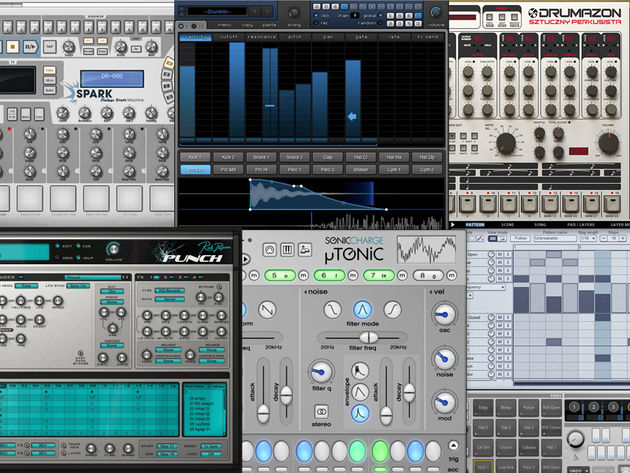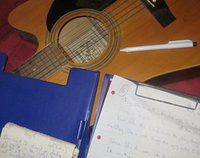…what do I do?? I see this question often on message boards and blogs all over the web. If you’re one of those out there asking this question, then let’s start at the very beginning (a very good place to start ;-)).
First of all, you might want to begin with an instrument like a piano or guitar. The majority of songs are written on either of these two instruments, so if you know a few chords, you’re already ahead of the game! Sit down and play around with a few progressions (a series of chords) and see what you can come up with. Don’t worry about writing a WHOLE song, just see if you can find a nice chord progression that pleases your ear, and then try humming something on top of it. Again, don’t worry about where it’s going to go or what it means or if it’s any good! The most important thing is to start the process. The “finessing” comes later. I’ll get back to the music part in a minute.
Some songwriters like to begin by writing down some lyrics. If you decide to start this way and then find yourself sitting there for an hour in front of a blank page, then don’t push it. It’s more handy to keep a pad of paper and a pen with you wherever you go, and/or a digital voice recorder (even smart phones come equipped with audio recording capabilities these days!). That way, when a line or phrase comes to you, you can write it down or record it for use later. However, you might find yourself writing lyrics at your first sitting. It’s REALLY important not to judge what you’re writing too much at the start, so if there is something there, let it flow out of you without editing yourself. The editing comes later!
Another question that comes up all the time is “what should I write about?”. The truth is you have a whole lifetime of experiences to write from, so that’s a good place to get some ideas. I’ve written two articles that relate to songwriting topics, one called the Songwriting Topics Poll and another called Nothing To Write About?, which is a little exercise to help you come up with some ideas.
Ideas are everywhere if you’re looking for them. You might hear a bit of conversation from someone, or read a line in a book that just jumps out at you. You might have had a particularly interesting experience, or just want to express your own view of something. Once you start getting some ideas out, you might start thinking about different parts, like putting in a chorus or a bridge. I’ve got an article called Song Forms And Terms that is a quick study on what these are and what their purpose is. In more in depth articles, I tell you more about the chorus in Don’t Bore Us, Get To The Chorus and the verse in The Verse’s Purpose, and even about The Bridge. Understanding the different parts of a song will help you to shape it and make it work.
If you are trying to create a melody for your song and struggling somewhat, I have an article on The Magic of Melody and another article on Putting Music to Lyrics which might help you if you’ve written lyrics, but don’t know where to do from there. The fact is that there are many, many articles on this site, but just start with the ones I have given you, and later on you might find the need to read some others!
A lot of people find it easy to start a song but not so easy to finish it. This is going to happen from time to time, so don’t worry if you lose steam part way through. Put it away and look at it again later. That is not to say that you can’t “finish” a song in one sitting, that happens too. Maybe you’re just chomping at the bit to write something and it all comes spilling out in one session. It’s exhilarating when this happens, so bask in the glow of your new found creative self! Then walk away from it for awhile and come back to it again. That’s why I put quotations around the word “finish” because there is no such thing as a song coming out perfect the first time. Unless you are Beethoven or some other musical genius (I know, I know…SURE you are :-)), the real work is going to come when you sit down and revisit and revise it.
Why would you bother? Because this, my new songwriting friend, is the mark of a good songwriter! A great painter doesn’t just slop some paint on a canvas and consider it done. There are always little spots that need re-doing, little touch ups that have do be tended to. So once you have complete song, teach yourself early to look for and fix the “bits” that don’t work. And that is for another blog!
Good luck with your new songwriting venture 🙂 IJ
 The question today is: Has production become more important than songwriting in today’s music? It’s not a new question, but it’s important to revisit from time to time. I actually saw a discussion of this on Reddit and it got me to thinking about it again.
The question today is: Has production become more important than songwriting in today’s music? It’s not a new question, but it’s important to revisit from time to time. I actually saw a discussion of this on Reddit and it got me to thinking about it again.



